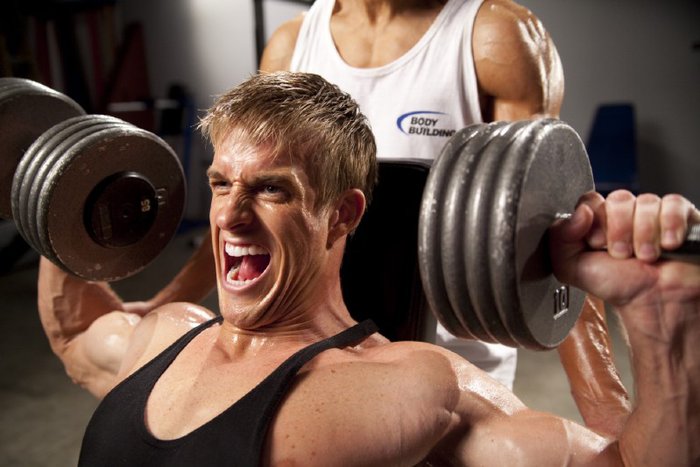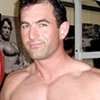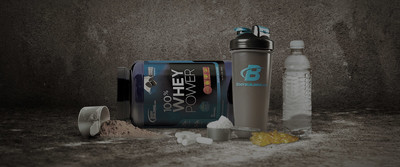In their quest for greater muscle size and the ripped, dry look that characterizes a top-level bodybuilding physique, competitors have, since the 1950's, as is generally thought, used a variety of supplemental substances, both naturally and pharmaceutically derived.
After experiencing unprecedented muscle growth with anabolic steroids in the early '60s (a time when these drugs were used in larger quantities as the level of bodybuilding competition increased), bodybuilding competitors knew they had found the critical factor necessary to take them several steps higher towards physical perfection, and iron warriors the world over have not looked back since.
With the 1970's ushering in a new era for competitive sporting success, with the emergence of lucrative contracts and entire careers based a upon athletic ability, a new compound found its way into the drug regimes of champions not adverse to pushing the boundaries: growth hormone (HGH).
As a hormone critical for the health and well being of all humans, growth hormone is needed in precise amounts for the optimal functioning of a number of physiological processes and growth of body tissues, including muscle. Generally this is achieved, resulting in growth and functioning within 'acceptable' and 'normal' parameters. However, an over or under production of HGH can potentially cause serious health concerns.

Excess HGH, as occurs in those with Acromegaly, ultimately leads to an overgrowth of tissues and problems such insulin resistance and muscle weakness.
HGH-secreting tumors, occurring in childhood, can also cause excessive HGH production and resultant Pituitary Giantism, as witnessed with Andre the Giant, for example, who at 12 years old stood 6'3" and at his full height was 7'4". He ultimately died from this condition.
As there can be problems with an over production of HGH there can also be so with too little. Genetic conditions and congenital malformations manifested through HGH deficiency can cause a lack of growth in children. Though rare, Growth Hormone Deficiency (GHD) in adults can cause decreased muscle mass, quality of life and energy.
In both of these groups, carefully monitored HGH supplementation restores the functions affected by HGH deficiency. Benefits, in this context, generally include reduced fat mass, increased lean muscle tissue, increased bone density, improved lipid (fat) profile, reduced cardiovascular risk factors and improved mental health.
Bodybuilders being bodybuilders soon realized that if HGH were introduced into their drug repertoire big muscles and shredded conditioning would result. And this is exactly what was experienced in those who began using this, until then, largely unknown anabolic agent.
Competitors of the '70s, and especially the '80s began to present a more refined look with chiseled muscle development reminiscent of Classical Sculpture and resembling deeply etched rock. Those guys, one could reasonably postulate, were not adding additional cardio to their programs and eating more lean proteins.
Since HGH had become a mainstay for serious bodybuilders worldwide, it has attracted its fair share of criticism: some feel it is extremely dangerous while others contend it simply does not very well at all.
Those who use it, however, know just how effective it can be. Indeed, since its inception, and first application as a bodybuilding super-substance HGH has remained an anabolic that has attracted many conflicting opinions and has been shrouded in mystery. I sought some answers.
One man who has, for many years, observed HGH being used, and who is the first to say how effectively it builds muscle and reduces fat, but is also realistic as far as its application and efficacy in all who use it, is Ali Amini.
"GH", says Ali, "is a single-chain protein made of 191 amino acids with a molecular weight of approximately 22 kDa (Kilo Daltons). It is released into the blood-stream by the somatotrope cells of the anterior pituitary gland. Initially it was taken from human pituitary glands, however, in 1985, biosynthetic HH replaced this earlier version."
What of Growth Hormone's widespread use and its application amongst the sporting elite? "GH is used in sport for its ability to burn fat, increase lean body mass, shorten recovery time and strengthen joints and ligaments while healing damaged tissue," says Ali.
"And as far as pro bodybuilders go, all of them use HGH, especially these days as it is much easier to get than in the early '90s. But it is not as essential a part of contest prep or of an off-season cycle as most think.
It helps a lot if taken in the right amount and at the right time according to the type of program/cycle one is on, but it is not a crucial aspect of the whole program."
Bodybuilding Benefits Of HGH And Effective Administration
"A lot of people think that HGH is a magic potion," says Ali. "But most of these people are not taking HGH at its maximum potential. HGH doesn't add 50% to your gains, not even close to that. By adding HGH to a cycle you will be lucky and considered genetically gifted and blessed (that your body responds well to HGH) if you get a 15% benefit/gain."
In light of Ali's observations HGH does not appear to be the magic bullet that many feel will give them bodybuilding success. However, if a bodybuilder were to solely use HGH while excluding anabolic steroids from their program, what kind of effect would this have on their physique?
"Very little in the way of muscle gains and a barely noticeable decrease in body fat," says Ali, perhaps controversially. "GH alone isn't that strong of an anabolic, and even though it has the property of holding protein synthesis, like testosterone, it doesn't provide a constant durability of its effect, like testosterone, nor does it noticeably increase strength like other anabolic drugs."
But, though not a miracle drug, HGH can work well for bodybuilders as shown in those who use it at optimal dosages. Surely if it is used by all professional bodybuilders it must have much merit.
"I know smart bodybuilders never do over 8 IU (International Units) a day, but, in some cases, I have heard of others doing 24 IU a day and even some non-pros, less then 150 lbs, who use 24 IU a day. This results in bloating because of all the water retention caused by that dose."
So what is the optimal dose of HGH one should take to attain its benefits? Ali: "To get the full effect of HGH, timing and amount are crucial. Needless to say, period taken and consistency is more important than the total amount, as taking a 200 IU kit of HGH over 50 days (at 4 IU a day) is more efficient than taking the same 200 IU over a period of 25 days (at 8 IU a day)."
As is clear from what Ali has said, HGH used in conjunction with anabolic steroids is the most effective form of administration. It is known to work, but how? What exactly does HGH do and what are its positive effects?
"GH diverts calories in food towards protein synthesis and away from fat synthesis as demonstrated in animal tests. It is as powerful as testosterone in stimulating protein synthesis properties."
Those who are HGH deficient are often cited as proof positive that HGH is an important building agent; that we all need it to function properly. Ali's take on HGH deficiency?
"GH-deficient (GHD) adults have reduced lean body mass and increased fat mass, particularly central abdominal fat mass, thus proving that the higher the HGH level, the more muscle mass and less fat is synthesized."
And how long does HGH have to exert its anabolic effects? "GH", Says Ali, "has a half-life of 15 to 20 minutes after sub-q (subcutaneous) or intravenous injection. After that, blood concentrations of HGH reach their peak between one and three hours after injection."
So once the optimal dosage of HGH and the potential benefits have been decided, how can it be administrated timing-wise?
"A lot of theories and speculation have made about the best way to administrate HGH," says Ali. "The most reasonable way would be decided after one gained an understanding of how HGH is produced in the body, how it interacts with other hormones and under which circumstances it converts best to IGF-1.
IGF-1 production is regulated by factors other than HGH, most notably nutritional and thyroid status. But when HGH is released it goes to the liver to stimulate a set of Growth Factors, and IGF-1 happens to be the best known of these.
"IGF-1 is a 70 amino acid single chain hormone that has been shown to be the most potent derivative (caused by HGH release or administration) of HGH," continues Ali. "GH is a hormone that works back to back with insulin so the lower the insulin, the more HGH the pituitary gland produces, and thus there will be a better environment for HGH to work.
Some speculations recommend taking HGH at any time because they say what I just mentioned is applicable for the HGH produced by the pituitary and not that externally administrated. However, the body produces HGH in those conditions because it is the best time for it, sequentially leading it to function at its maximum potential.
Therefore, using HGH at a time when insulin is low (using blood sugar as an indicator), post workout would be the best time to use it. However, if administrated in conjunction with insulin, HGH should be taken immediately post workout with the insulin administered within a 30-40 minute window after that."
Since within bodybuilding circles it is common knowledge that elite competitors take HGH twice a day, and that timing is of the essence, if post workout is one of these optimal periods, when is the other?
"A second dose," says Ali, "can be taken before going to bed, again at a time when ones blood sugar is very low as when a bodybuilder is getting ready for a show and is on low a carbohydrate diet; this is the optimal period - night - especially if a low carbohydrate meal was the last meal or two.
However, it would be even better to take it (the second HGH dose) during the sleeping period, when, for example, waking up in middle of the night to go to the bathroom."
Optimal Dosage And Timing
And what, typically, would each of the two dosages be?
"The main benefit of HGH is its action on the liver to produce IGF-1," says Ali. "So, for this matter, it is important to know the capability of the liver in terms of how much HGH it can use to get the maximum result/benefit. The liver can work with three to four IU of HGH at a time and can do that twice a day with a reasonable gap of five to seven hours.
Therefore, the best dose would be a total six to eight IU a day divided into two doses and having those five to seven hours apart. For example, a dose (either three or four IU) can be taken post training with another three to four IU dose before bed or during the night sleeping period."
Clearly, as with any anabolic agent, there is an optimal dosage, but it has not been clearly documented as to what would occur if one took too little or too much HGH. If one took below the recommended IU of six to eight per day of HGH, as Ali recommends, what effects, if any, could they experience? If a bodybuilder took, for example, 2 IU, what effect would this have?

A Dose (Either Three Or Four IU) Can Be Taken Post Training.
"What I recommend," says Ali, "is aligned with the capability of the body to use HGH at maximum doses to produce maximum effect. However, taking less will definitely work and the gains will be noticed, just not at full potential (the body's full capability of occupying HGH and employing it)."
Conversely, what would be likely to happen if that same person took well over the recommended amount? If they took, for example, 20 to 25 IU what could happen?
"Nothing dramatic," says Ali. "Just some water retention side effects, in a case where the subject abusing HGH is not suffering from any kind of disease. But if you understand how HGH works in the body and how the body utilizes it, it will become pretty obvious how, when and how much you should take.
Needless to say, trying to make HGH use more constant for a longer period of time will result in more gains and make it much more cost efficient, as the legitimate form of it is still not cheap."
That being said, HGH does, like any other drug, hold dangers if used irresponsibly. So exactly how does HGH compare to other anabolic drugs in terms of health problems if used excessively?
"Anabolic steroids can cause serious problems if overused," says Ali. "With some, the side effects are harsher than others. 17aa (one of the most potent steroids ever synthesized) is the least of your problems when you talk about overdosing, as insulin, Trenbolone and diuretics respectively are the most dangerous when overdosed.
With HGH, by comparison, you don't need any special form of detoxification post cycle, as the body doesn't become toxic from legitimate HGH."
GH And Insulin: Negative Interaction
As Ali says, insulin, a transport hormone, secreted from the pancreas to store nutrients in various body tissues, can be extremely dangerous if taken synthetically for bodybuilding purposes. It is also understood that insulin and HGH do not interact positively with one another to produce lean muscle gains. What is the deal here?
Ali: "By introducing insulin to your body, HGH and thyroid hormone levels drop dramatically. That is just how the human body works. Therefore you need to supplement your body with the two hormones mentioned to compensate the shortage, edge out the gains and minimize the side effect of insulin.
Naturally, HGH is produced best when insulin levels are low, and biologically that is the best time for HGH to be produced and to begin working." How is this dilemma solved among bodybuilders who use HGH?
"I do, however," says Ali, "recommend taking insulin and HGH together, but not at the same time. Depending on your insulin protocol, which we won't get into here because this is a discussion about HGH, HGH should be taken when insulin is low. And I advocate this protocol because this is the way the body works and all we can do is learn more about this and act accordingly.
You can say that the body is doing this in absence of an external source of HGH and insulin and choose to take them both at the same time. But why risk the benefits and gains when there is no study to prove this?
And what I am recommending is what is recommended by the body in the first place. As I said, HGH can be taken post workout in an intramuscular manner to reach the system ASAP and then insulin can be introduced 30-40 minutes after that."
Best Form Of Administration
GH can be taken in a variety of ways, but what is the most effective method? What do the pros do? Ali: "The most common has been sub-q (subcutaneously) for years, and a lot are still doing so. However, this was the medical method used when it was first introduced for HGH-deficient people or infants born with a very low birth weight and/or lack of height.
But in the case of "HGH in sports" it is different. The administrator is not a deficient patient; he is a person who wants HGH to work in his body as soon as possible to get the most benefit from it, making the intramuscular (IM) method the best choice for administration in athletes as, in this fashion, it reaches the system much faster and starts its actions sooner than a sub-q injection."
Side Effects
It is often thought that the larger the competitor, the more HGH they will need to realize any kind of benefit. It seems this is yet another myth.
"The size and weight of the athlete is not a big factor here as it all depends on the liver's capability to utilize HGH and produce IGF-1," says Ali. "Even though some athletes take up to 24 IU of HGH a day, the body/liver can't utilize this amount, hence the abuse of HGH and the undesirable side effects that can be seen."
As is known, all drugs have their share of side effects. What can be expected as far as the deleterious effects of taking HGH? Can death result, as some think?
"There has been nothing recorded or reported on the matter of dying from HGH," says Ali. "However, HGH has the tendency to worsen any cancer due to its cell volumizing and anabolic effect on a cell's size. These are the serious potential effects. Jaw and nose growth are the main, and most noticeable, signs of using HGH over a longer period.
No study has yet proved that HGH causes cancer, even though a lot of speculation is made. The truth is: the cause of cancer is still not clear today. So no HGH or, for that matter, any anabolic steroid is cancerous (theoretically to date) unless the person has been suffering from cancer before using any kind of anabolic; which, in some forms of cancer, the usage of anabolic drugs might worsen the case."
GH Detection
As Ali suggested before, the intramuscular method of HGH administration is the most popular, as this causes a faster cascade of Insulin-like growth factor 1 (IGF-1) and faster growth as a result. Why is this method best exactly? Why can't it be taken orally like some anabolic steroids?
According to Ali this is "because it is a protein hormone and, as a result, has to be administered by injection as it is completely digested to its basic amino acids (the amino acids it was made of) when administered by mouth, which means it can't be differentiated from an oral amino acid supplement. Thus, only injectable administration can allow HGH to function at its full potential."
This being the case, can HGH be detected in a drug test?
Ali: "Due to the liver and kidney internalizing the HGH-receptor complex and completely degrading it to its basic amino acids, only minimal quantities of HGH appear in the urine and the pattern of urinary excretion has been shown, in those using, to be too low, leading its metabolites in a urine sample to look identical to the metabolites of orally administrated amino acids, making HGH an undetectable drug in a doping test."
Growth Hormone: Good Or Bad?
With their eternal search for a bodybuilding edge, bodybuilders have turned to synthetic growth hormone to boost what nature provides for them naturally. But is it as effective as many are led to believe?
The fact bodybuilders at the cutting edge use it to obtain rock hard definition and additional muscle size is testimony to its powerful nature, but according to Ali it is not a miracle substance and will not work as effectively as steroids for adding pure muscle mass.
However, in today's ultra competitive bodybuilding climate any edge appears to be worth pursuing and chemicals seem to be a firmly entrenched way in which to gain it. So is HGH use good or bad?
From an effectiveness standpoint there is much divergence of opinion, with those considering it to be essential and those, like Ali, who feel it might add the finishing touches to a base of rock hard muscle that hard training and good nutrition has first established.
From a health standpoint there has been not one documented death directly attributable to HGH administration, nor does it seem this hormone is as dangerous as some of the more powerful steroids along with insulin and diuretics, the latter of which has taken lives.
With its high cost and, in some quarters, questionable effectiveness, is HGH worth the time and expense? As the pro bodybuilding scene continues to grow, along with it athletes, themselves ably assisted by various chemicals, a definitive answer will likely be given sometime soon.
Disclaimer: Conclusions and opinions given in this article are for educational and entertainment purposes only. They do not necessarily represent those of this site and David Robson.



